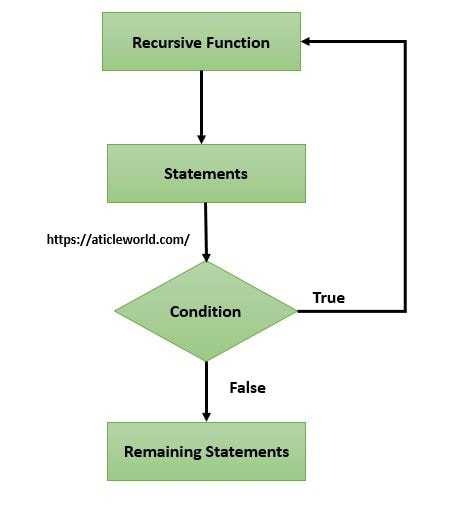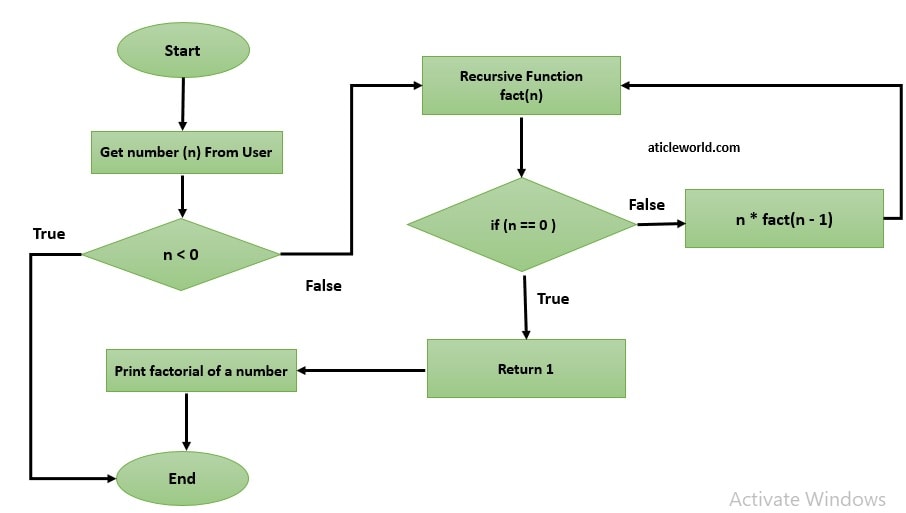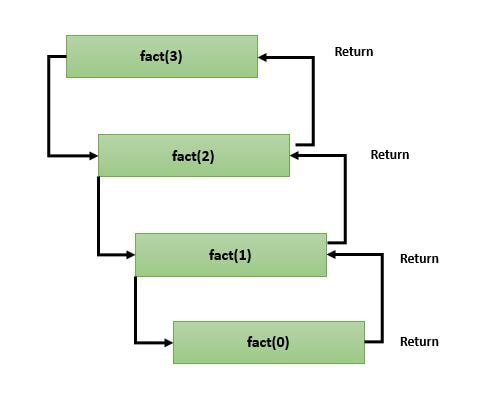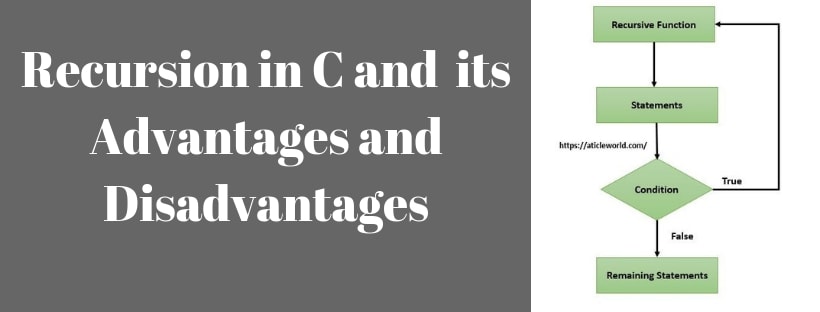Recursion is a process in which function call itself and the function that calls itself directly or indirectly called a recursive function. A recursive function calls itself so there can be several numbers of the recursive call, so the recursive function should have the termination condition to break the recursion. If there is a not termination condition in a recursive function, a stack overflow will occur and your program will crash.
Recursive functions are useful to solve many mathematical problems, like generating the Fibonacci series, calculating the factorial of a number, and convenient for recursively defined data structures like trees.
Let’s see an example,
void test( int n)
{
test(n);
//code
}
In the above code, the test() is a recursive function that calls itself. You can see, if you will not put termination condition in the test(), stack-overflow will occur. So we have to put a condition in the test() to avoid an infinite loop (until not stack overflow occurs).
See the below code,
void test()
{
if(condition)
{
test();
}
//code
}

Direct vs. Indirect Recursion
A direct recursive function is a function that is called itself.
See the below code,
void Test()
{
// Some code....
Test();
// Some code...
}
A function is called indirect recursive if it calls another function and the called function call the calling function.
For example, Test() is called the called indirect recursive function if it calls another function to say Test1() and Test1() calls Test() directly or indirectly.
void Test()
{
// Some code....
Test1();
// Some code...
}
void Test1()
{
// Some code....
Test();
// Some code...
}
If you want to learn more about the c language, here 10 Free days C video course for you.
How does recursion work?
If you are going to create a recursive function then you should remember that each invocation of the recursive function creates a fresh set of all automatic variables.
Let see a code to understand the working of the recursive function.
In below code, I am creating a recursive function to calculate the factorial of a number. Basically, factorial is the product of the all positive number from 1 to n (n is the number). In simple word you can say that factorial of n would be 1*2*3*…..*n.
Factorial of positive number would be:
!n = n * !(n-1) For example, !5 = 5*4*3*2*1*!0 = 120
Note: !0 and !1 will be 1
Code to calculate factorial of a number using recursion in C
Before writing the code I want to show here a flow diagram which to describe the flow of the code.

#include <stdio.h>
//Calculate factorial in C
unsigned long fact(unsigned long int n)
{
if (n == 0)
{
return 1;
}
else
{
return(n * fact(n - 1));
}
}
//Driving function
int main(int argc, char *argv[])
{
unsigned long n = 0;
unsigned result = 0;
printf("Enter a positive integer number: ");
scanf("%lu", &n);
//check negative number
if (n < 0)
{
printf("\nFactorial of a negative number dose not exist \n");
}
else
{
result = fact(n);
printf("\nThe Factorial of %d is : %d.\n", n, result);
}
return 0;
}
Output:

Working of the above code,
Here n = 3
fact(3) = 3 * fact(2)
fact(2) = 2* fact(1)
fact(1) = 1 *fact(0);
When n=0, condition becomes true and recursion stops and control returns to factorial(1). Now reverse process occurs and function will return a value to the previous function calls.

So final result will be:
fact(3) = 3*2*1 = 6
Advantage and disadvantage of recursion in C
A recursive function has a lot of advantages and disadvantages. here I am mentioning a few advantages and disadvantages of the recursive function.
Advantage:
1. Using the recursion you can make your code simpler and you can solve problems in an easy way while its iterative solution is very big and complex.
2. Recursive functions are useful to solve many mathematical problems, like generating the Fibonacci series, calculating the factorial of a number.
3. Recursive functions are convenient for recursively defined data structures like trees.
Disadvantage:
1. Recursion makes your code slow because each time needs to create a stack frame for the function call.
2. Recursion takes a lot of stack memory because it requires the stack space in every invocation.
3. A recursive function should have a base condition to break the recursive calling of the function either it will cause of the stack overflow.
4. If recursion is too deep, then there is a danger of running out of space on the stack and it can cause of the program crashes.
Recursion vs Iteration
1. Due to the overhead of maintaining the stack usually, recursion is slower as compared to the iteration.
2. Usually, recursion uses more memory as compared to the iteration.
3. Sometimes it is much simpler to write the algorithm using recursion as compared to the iteration.
If you have any doubts regarding the recursion in C, please write the comment in the comment box. I will resolve your problem as soon as possible.
Recommended Posts for you
- Call by value and call by reference.
- Pass an array as a parameter in the function
- Return multiple values from a function in C programming
- How to use the structure of function pointer in c language?
- how to pass an array in the function.
- How to access pointer inside a structure in c.
- Function pointer in structure.
- Pointer Arithmetic in C.
- Memory Layout in C.
- Union in C, A detailed Guide.
- typedef vs #define in C.
- Macro in C, with example code.
- enum in C, you should know.

